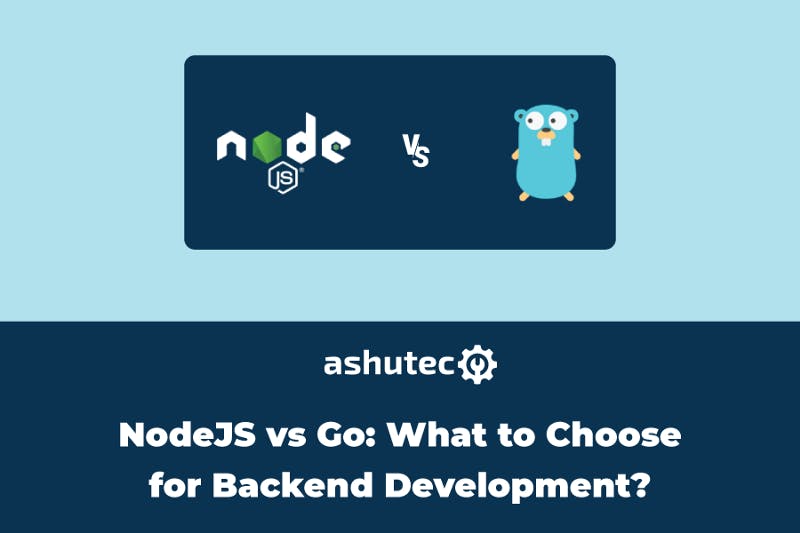Let’s Connect!
Work can be a fun when we know and understand each other well. Let's start conversation to new beginning
+91 63542 35108
To discuss what we can do for you Give us a Call
connect@ashutec.com
Tell us about your next project Write to us

The backend is undoubtedly the most vital part of any application, which helps bring necessary operations to life and keeps business logic working. The front-end UI is only the first part of the equation of building a whole web application. Several factors define the quality of an app, such as its ability to perform and scale smoothly and overall system security.
Tech stack for backend development has many options, like Ruby, Node.js, Go, Python, PHP, etc. Having a clear understanding of facts about each of these technologies is essential to picking the right set of tools. All of this depends directly on the backend of the application.
Node and Go both are relatively new and growing in terms of popularity. But which is the best for backend development? Let’s dive in to find out which fits best for your project backend.
Node.js is an open-source javascript runtime environment built on Google Chrome’s V8 Javascript engine. After its introduction in 2009,Node.js has become a popular tool for building cross-platform applications.
Node.js extends the limits of javascript beyond web browsers and is a perfect tool for building server-side business logic. It is currently the backbone of almost all modern JavaScript tooling.
Its non-blocking I/O architecture allows developers to build a highly scalable, lightweight, and fast application. Top companies of the modern age like Netflix, Trello, and Linkedin are using Node.js for their applications.
NodeJS is written in Javascript, making it easier for developers to write client-side and server-side scripts using a single language. It is supported by Windows, Mac, Linux, and Unix and has plenty of libraries that simplify the web development process.
Golang, popularly called GO, is an open-source statically typed multi-purpose programming language by Google in 2007. Its syntax shows similarities with the C programming language.
It allows safe memory usage, object management, and better garbage collection. Codes written in GO are compiled directly into machine codes, and the language favors speed and efficiency.
Go works best for cloud-based interfaces, networking applications, real-time development, and other microservices. It is a structurally solid and effective way of handling concurrent programming and is preferred for its dynamic interfaces.
It is predicted that there will be more use cases for Go. 19% of DevOps are planning to use Go in the future, a 9% increase from 10% of the current usage of Go.
Now we know the basics of both, it’s time to dive into comparing them and find the best fit for your project.
It is the prominent feature that differentiates Node.js and Golang. Golang performs at a high level in terms of speed and memory management. Their memory management tools, like Garbage collectors, thrive on a solid yet straightforward structure.
Node.js is only trailing a little with GO in performance. An improved single-threaded Node.js boosts efficiency as it ensures that the application runs without needing an interpreter.
In 2016, Uber even migrated from Node.js to Go to enhance their micros services. Go’s statically typed, and raw CPU performance suited Uber’s Algorithms better, and multi-threading provides smoother usage of resources.
On the other hand, PayPal released a report that they switched operations from Java to Node.js, which led to a 35% decrease in average response time and served pages 200ms faster with this new stack.
Still, Golang has better raw performance and stability, but both have substantial benefits in the workplace.
Concurrency is an essential factor for enterprise-scale apps and apps that receive thousands of requests simultaneously. The more concurrent an app is, the less chance of the app being crashed under a considerable load.
Node.js handles concurrency with APIs like worker_thread, clusters, and child_process, ensuring that incoming requests are processed reliably.
While Go is built to handle concurrent tasks, GoRoutines allow applications to run multi-threaded functions without compromising RAM. It makes GO a better candidate for processing intense jobs without affecting its functionalities. Rob Pike, the creator of Go, says that Go is an excellent tool for large software projects.
Since both Node.js and Go are open source, whole communities are engaged in improving these languages, fixing bugs, and creating new proposals and packages. Both have their repositories on GitHub.
As of 2018, the number of Node.js downloads has crossed the 1 billion mark. It indicates how widespread Node.js is and the community is supporting its usage.
Go has similar signs in terms of popularity and has 83.2k stars on Github. However, Node.js has 24000 closed PR, and Go only has 1200. It clearly shows a massive difference in the community development of both technologies. Thus, Node.js wins here.
Go demands developers to implement explicit error checking. The compile-time and run-time errors are handled differently, raising developers’ problems. Compilation errors are often syntax related and can be rectified in code.
In August 2018, Go developers announced the development of Go 2, which will possibly include additional support for error handling.
On the other hand, Node.js implements the traditional throw catch error mechanism, which is popular among programmers and developers. In this process, the errors are displayed and corrected immediately before performing further operations.
The above points prove that it isn’t easy to decide which is better, Node.js or Go. It greatly depends on the type and characteristics of the app we are building. Both technologies are good at different things.
If you are familiar with javascript, then using Node.js makes complete sense. But if you are not good with javascript, Golang is an absolute must for development.

